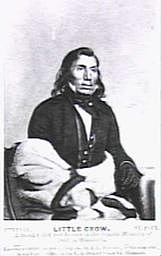
[1]
Braves, you are like little children; you know not what you are doing.
You are full of the white man's devil-water (rum). You are like dogs in the Hot Moon when they run mad and snap at their own shadows. We are only little herds of buffaloes left scattered; the great herds that once covered the prairies are no more. See! --the white men are like the locusts when they fly so thick that the whole sky is a snowstorm. You may kill one -- two -- ten, and ten times ten will come to kill you. Count your fingers all day long and white men with guns in their hands will come faster than you can count.
Yes; they fight among among themselves -- away off. Do you hear the thunder of their big guns? No; it would take you two moons to run down to where they are fighting, and all the way your path would be among white soldiers as thick as tamaracks in the swamps of the Ojibways. Yes; they fight among themselves, but if you strike at them they will all turn on you and devour you and your women and little chidden just as the locusts in their time fall on the trees and devour all the leaves in one day. You are fools. You cannot see the face of your chief; your eyes are full of smoke. You cannot hear his voice; your eyes are full of roaring waters. Braves, you are little children -- you are fools. You will die like the rabbits when the hungry wolves hunt them in the hard Moon (January). [Speech of Little Crow, Through Dakota Eyes]
[2]
The morning after the battle of Wood Lake, Little Crow sent word to father to come, he wanted to see him. . . . The lower corner of the door was carried up and fastened back so the end of the tent was open. Little Crow sat inside just to the right of the open door. They spread a rob or blanket in the center for father to sit on. The warriors were all dressed and painted, standing outside next to their chief, all leaning on their guns. Father said, "What a fine lot of men they were." There was a silence, then father spoke "Cousin," he said (they had always called each other cousin) "I heard you wanted to see me so I have come." Little Crow answered and said, "Yes, cousin, I am going to grant it to you." Father answered. "Yes, cousin, we are most safe now. General Sibley will be here soon, and I would like that you and your warriors would give yourselves up." Little Crow with a derisive laugh says. "Wo Pa Tun Han Ska." ["]The long merchant Sibley would like to put the rope around my neck but he won't get the chance.["] Father said, "I don't think they will hang anybody[;] they never did before." "No, cousin," he said, "anything else, but to gibe myself up to hang by the neck like a woman. If they would shoot me like a man I would, but otherwise they will never get my live body."
Father then said, "if you can't do that, then I would like to get the prisoners.["]
Little Crow said, "Yes, you shall have them[.]" To his warriors he said any of you that have a prisoner or anything that belongs to them give them back, and fetch them to this man. All answered "ho" (Yes). And all turned around and hurriedly left to comply with the request of the only man, as Little Crow said, they could love and respect. He had never turned a deaf ear to them. Had always been like brothers, until the outbreak. So this last favor showed how they called upon the only man they could favor in their last adieu.
There is something holy and impressive to see these warriors who had for a space of five weeks, and three days spurned father's warning and advice, and at the last moment show him so much regard.
Truly the works of God are indeed mysterious. Father took the names of the prisoners as fast as they were brought to him. There were 107 he got right there.
When he started with them to the Friendly camp, they trotted after him with great bundles tied up in the white sheets and table clothes [cloths] so heavy they would drop them to the ground, then to fling them back over their shoulders. I[t] would swing around and drop to the ground again.
Some carried little children. They asked father many questions about their folks. Father knew they would never see them again. Some might have been saved. He did not know. He hated to shatter their hopes by telling them the sad facts. He gradually distanced them to keep the truth from the awhile longer. He would not be the first to tell them. There might be a shadow of doubt their lives were lost. There were [was] no hope of seeing their loved ones again. [Cecilia Stay's Account, Through Dakota Eyes]
